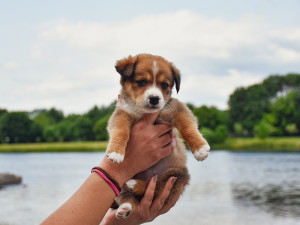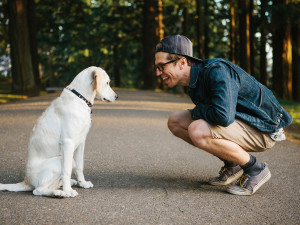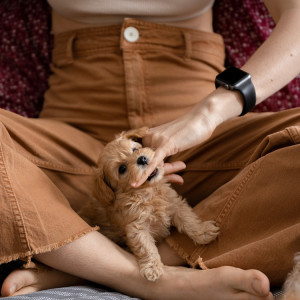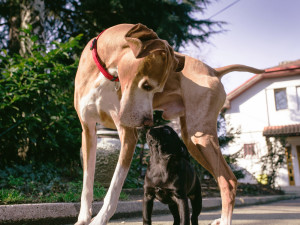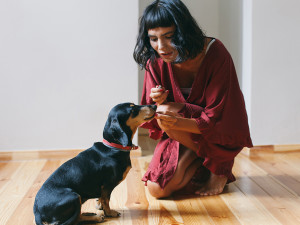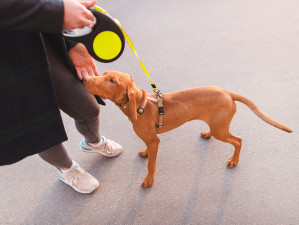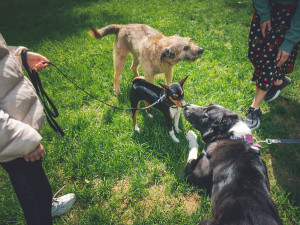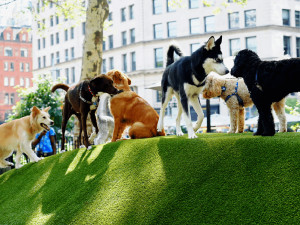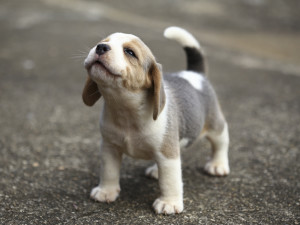What to Expect at Puppy Socialization Classes
A dog behaviorist schools us on why puppy classes are more about socializing than getting straight As.
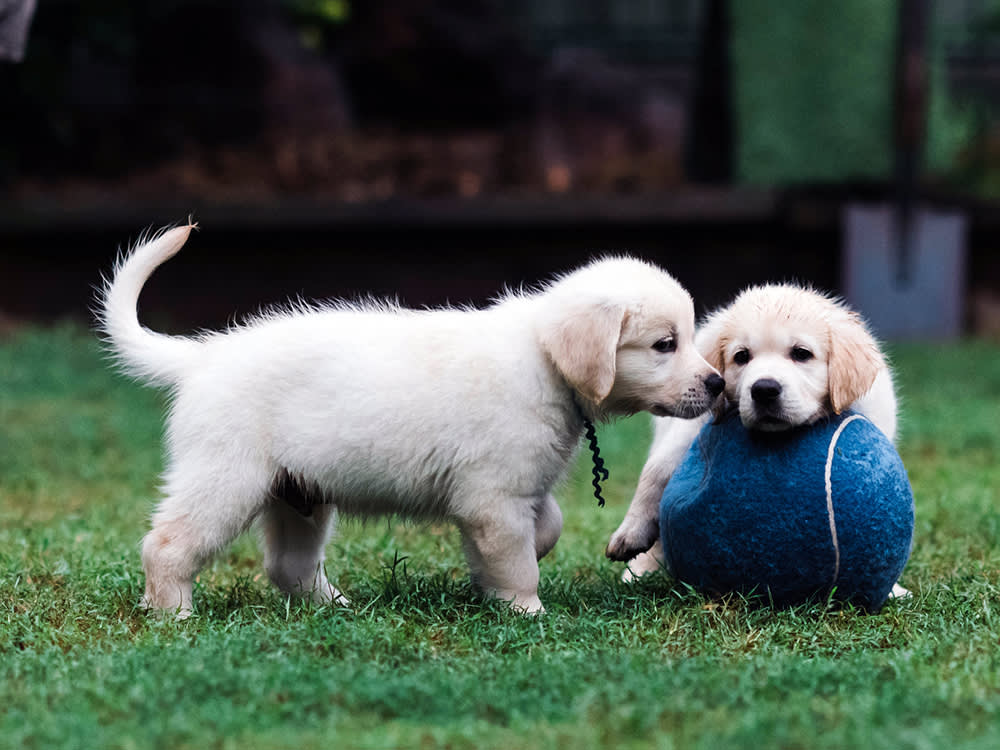
share article

Your pet wants you to read our newsletter. (Then give them a treat.)
Adopting a puppy is often the first taste many people get of what it feels like to become a legit parent. You may experience a sharp, sudden urge to set your pup up for a lifetime of excellence — spending untold hours scouring pages of chew toy and dog walkeropens in a new tab reviews, and (heaven help us all) puppy Reddit. But there’s one thing you can do for your puppy that will truly influence the kind of dog they become: puppy classes.
What are puppy classes?
You might be under the impression that a puppy class is about teaching your pup basic commands, but its goal is actually simpler — and arguably more important. It might be more apt to call these courses dog socialization classes. “A puppy class is mainly for socialization,” says Lauren Novack, a dog behavior consultant at Behavior Vetsopens in a new tab in NYC. Not to stress you out, but “dogs have a very short socialization period and what happens during this time will set the tone for how they see and interact with the world around them. That window usually closes for puppies at around 12 to 14 weeks of age.” It starts much earlier than that.
How important is puppy socialization?
“All of the experiences puppies have within their first 14 weeks of life make a permanent imprint on their brain about what’s safe and unsafe in the world,” Novack explains. “It’s critical that during this period the new experiences your puppy has are positive — you don’t just want them to tough it out on a noisy city street; you want them to be curious about all the elements of it and confident about making good decisions.”
Why should I enroll my puppy in a class?
Socialization is what a good puppy class can help with, and it’s why the importance of puppy class really can’t be overstated. It sets up a careful rubric of experiences for your pet and teaches you how to read their body language so that you don’t overwhelm them. There may also be a brief — emphasis on brief! — time for puppies to play together under supervision.
What you should I look for in a puppy class?
This part is really important. “It would be better not to go to puppy class than to go to a bad one,” Novack says. “In that critical developmental period, it’s just as important to avoid bad experiences as it is to provide positive experiences. If you buy a puppy rather than adopting one, look for a reputable breeder who actively socializes their puppies until they pass them off to you. If you adopt a puppy from a shelter rather than a foster home, get them into a puppy class right away.” Trainers should be certified and have experience in puppy socialization, Novack adds. One major red flag is if the trainers use any kind of punishment or aversion techniques. “That’s something you should run far, far away from.”
When is the best time to start puppy classes?
Dog socialization training should be started within the 12 week time period that’s so important for socialization. The American Veterinary Society of Animal Behavior recommends that puppies start classes around seven to eight weeks old after their first distemper/parvo vaccineopens in a new tab.
How long does a typical puppy class last?
Schedules for puppy classes can vary. Some are once a week, while others are multiple times a week. Puppy class usually lasts around six to ten weeks, but lengths vary depending on the program.
What will my puppy learn in a puppy class?
For very young puppies, group puppy training is mostly focused on socialization rather than trick-training or obedience training. Your puppy will learn valuable social skills, including bite inhibitionopens in a new tab, that will set them up for many happy and safe days at the dog park. Your pup may also have a chance to improve on everyday puppy skills like walking on a leashopens in a new tab and potty trainingopens in a new tab.
And don’t be surprised to not see any puppies at your first class — a humans-only introduction gives the trainer a chance to train you on things like when to reinforce your puppy’s behavior and how to understand their body language. Again, don’t expect to learn many obedience tricks in class. “Your pet can always learn skills,” Novack says. “But the opportunity for puppies to learn how to socialize without fear is brief — and it’s not a time you can get back.”
How to Socialize a Puppy
It’s helpful to get the guidance of a certified trainer if this is your first time attempting to socialize a dog, or even if it’s just your first time socializing a puppy with a unique temperament — like if they’re shyer opens in a new tabor mouthier than your previous pets. But if an in-person puppy class isn’t in the cards, Novack recommends finding an online training course to give you a solid foundation.
A few guiding principles can help you at home. First, think about all of the things your dog will encounter over their lifetime. Hair dryers! Nail clippings! Screeching tires! Little kids! Tall people! And so many other dogs! You want to expose your puppy to as many things that will be part of their regular lives as possible. But not all at once. Aim for “small introductions, one at a time, making sure that your puppy feels calm and safe and happy,” Novack says. One other thing: don’t forget about your puppy’s feet. Give them the opportunity to walk on as many different surfaces as possible — tarmac, astroturf, grass, sand, sidewalk grates, and so on.
Don’t Force Puppy Socialization
Not all puppies are going to approach every exposure with enthusiasm. That’s okay — and it’s important that you don’t force your dog into an experience they’re not ready for. “What you want to make sure of is that they’re willing to go outside, their body language is loose, and they’re doing it on their own,” Novack says. “If your dog is hesitant, break the task into smaller pieces.” For instance, if your puppy is nervous about going outside, see if they’re curious about just leaving your apartment’s front door. Once, they’re comfortable with that, see if exploring the hallways interests them. If their body language is relaxed there, see if they’re curious about going in and out of the elevator. Baby steps.
“Letting your puppy participate in the decision-making is key,” Novack explains. So is understanding that socialization continues even after your formal sessions are over. The skills you learn in puppy class should be applied to every interaction your pup has with new stimuli. “Socialization is happening 24/7.”
FAQs (People Also Ask)
What if my puppy misbehaves during class?
Don’t worry about your puppy being a little unprepared for puppy play class — by definition, all the class members will be newbies who are still learning! If your pup misbehaves, the class leader will be ready to settle and redirect your dog. Be sure to find a trainer who uses positive reinforcement trainingopens in a new tab, since a dog should never be punished.
How do I find a reputable puppy class?
Ask some trusted sources where you can find a puppy class; you might start with your veterinarian, dog walker, groomer, shelter, or pet-parenting friends. Check out these pro-tipsopens in a new tab for finding a qualified trainer.
Can I bring my kids to the puppy class?
Whether or not kids are allowed at puppy groups depends on the program. Some will encourage all family members to participate, while others will ask that kids under a certain age stay home.
References
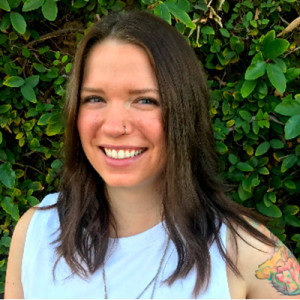
Colleen Stinchcombe
Colleen Stinchcombe lives near Seattle, WA, where she works as a writer, editor, and content strategist. Her two rescue pups wish she were a professional ball-thrower.
Related articles
![woman gives small black dog treat for sitting]() opens in a new tab
opens in a new tabYour Dog Should Do This 30-Day Training Challenge
It’s like your 30-day yoga challenge — except with way more training treats.
![A puppy outside on a leash]() opens in a new tab
opens in a new tabHere’s the Potty Training Game Plan You’ve Been Waiting For
Seven tips you’ll want to pay attention to.
![Three dogs on leashes meeting and sniffing each other on a walk on the summer grass with owners]()
How Do I Get My Shy Dog To Socialize?
The Wildest Collective dog trainer Robert Haussmann’s tips for getting a shy pup to go from wallflower to social butterfly.
![dogs at dog park drinking water and playing in pool]() opens in a new tab
opens in a new tabDog Park Etiquette: Dog Park Dos and Don’ts
New kid on the block? Follow this trainer’s tips before letting your pet run wild.
![Two hands holding a very young tan and white puppy up in front of a lake landscape]()
How to Socialize a Puppy
Everything you need to know to get your new addition off to a good start.
![single puppy standing outside]() opens in a new tab
opens in a new tabSingle Puppy Syndrome: One-Puppy Litter
One doesn’t have to be the loneliest number when it comes to your dog.
